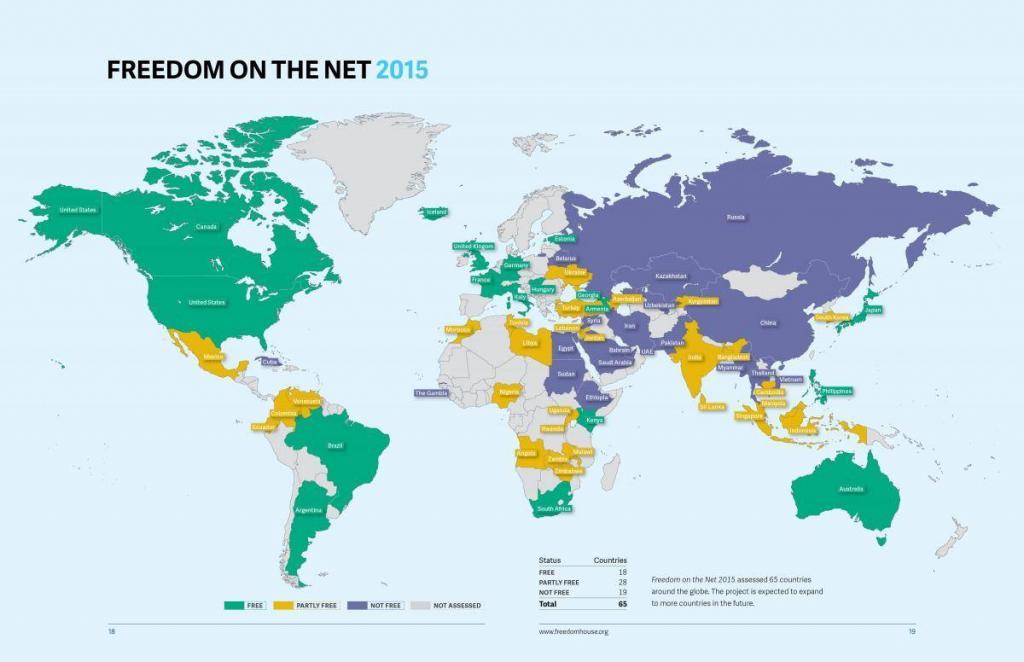Estonia is once again near top of the chart when it comes to internet freedom. Freedom House’s ‘Freedom on the Net 2015’, which is the most authoritative report in the field, ranked Estonia as second in the world for the third year in a row, just behind Iceland once again.
The Freedom House report investigated 70 geographically dispersed and politically diverse countries, and ranked them according to obstacles to access, limits on content and violations of user rights. These results translated into quantitative (0-70) and qualitative (free, partially free, not free) ratings. Estonia retained the status of “free”, and actually improved its score from last year by one point.
The report highlights facts that will come as no surprise to most Estonians or even those who have visited or studied the country in recent years. The rate of internet penetration is high and growing, public wi-fi is widely available and there are few if any restrictions on content. Estonia’s e-government services, such as i-voting and online tax forms, continue to garner praise for making the government more efficient, accountable, and transparent for society at large. Online comments can get heated, but there have been no documented cases of these translating into real-world violence. Furthermore, arrests or attacks against bloggers, activists, and journalists are non-existent. Estonia’s laws are conducive to internet freedom and its people are continuing to become more competent in terms of security and privacy online. The country is a frontrunner is virtually every aspect of modern society that is measured by the report, which says that “Estonia has become a model for free and open internet access as a development engine for society.”
However, Estonia cannot and should not rest on its laurels – it must continue to lead by example and do what it can to push the world toward greater internet freedom in the months and years to come.
This promises to be no easy task, given that internet freedom is on the decline around the world for the fifth consecutive year. For the first time since Freedom House started to report on this topic, there are now more “not free” than “free” countries in the world in terms of freedom online. In fact, 47% of the world’s population live in countries that don’t just use censorship and surveillance, but where individuals have been attacked or killed for their online activities. 32 out of 65 countries continue to be on a negative trajectory since June 2014. Overall, 2014-2015 was characterised by a greater push by states for content removal, a rise in surveillance laws and technologies, government targeting of encryption and anonymity online, and an escalation of arrests and intimidation of users.
The question of internet freedom is integral to the future of political, economic and social life around the world. Technological advances mean that our lives continue to become more connected by the day. Furthermore, an increasing amount of the world’s population comes online every year. The context in which we communicate, do business, and interact with our governments will contribute to defining us as individuals, organisations and even nation-states. How will the internet look in five, 10, or 20 years? Will the world continue to use the internet to generate economic growth and social activism, or will fears about domestic stability and national security lead to a fragmented, patchwork network of networks?
There is no doubt that an open, free, secure, and interoperable global internet is in Estonia’s national interest. We have already seen that technological advances and freedom online can produce entrepreneurial successes, improve governmental efficiency and enable social progress. Estonia must continue to work with like-minded states and other stakeholders to promote a vision of the internet that is conducive to the exercise of political liberties and the achievement of economic progress. This means including the topic in public speeches, putting it in the talking points between meetings with other international leaders, continuing to prioritise internet freedom in our development cooperation projects, and contributing actively, empathically and effectively to the global debate on norms of internet governance and freedom online. Programs such as the e-residency initiative, which among other things provides people around the world with free and trustworthy encryption capabilities, continue to show the potential that Estonia holds in this field.
The battle for the future of the internet continues to heat up. Estonia must continue to do its utmost, with both words and deeds, to convince both its democratic allies and its more authoritarian partners that internet freedom is a fundamental right that should be nurtured and expanded around the world.
‘Freedom on the Net 2015’ top 10:
- Iceland
- Estonia
- Canada
- Germany
- United States
- Australia
- Japan
- Italy
- United Kingdom
- Hungary
Cover by Freedom House.


No problem getting that high score. Only a limited number of nations are compared. Among states not ranked are all Nordic and Benelux states, Austria, Switzerland, Spain, Portugal, the other Baltic states (Latvia and Lithuania), and many others. So Estonia could win the soccer world cup if Barzil, Argentina, France, Italy…. did not participate.